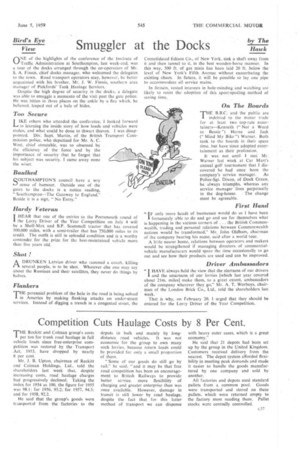Competition Cuts Haulage Costs by 8 Per Cent.
Page 79

If you've noticed an error in this article please click here to report it so we can fix it.
THE Reckitt and Colman group's costs per ton for trunk road haulage in full vehicle loads since free-enterprise competition was restored by the Transport Act, 1953, have dropped by nearly 8 per cent.
Mr, J. B. Upton, chairman of Reckitt and Colman Holdings, Ltd., told the shareholders last week that, despite increasing costs, road haulage charges had progressively declined. Taking the index for 1954 as 100, the figure for 1955 was 98.1; for 1956, 95.2; for 1957, 94.3; and for 1958, 92.2.
He said that the group's goods were transport2d from the factories to the
depots in bulk and mainly by longdistance road vehicles, It was not economic for the group to own many such lorries, because return loads could be provided for only a small proportion of them.
"Some of our goods do still go by rail," he said, "and it may be that free road competition has been an encouragement to British Railways to provide better service. more flexibility of charging and greater enterprise than was once available. However, damage in transit is still lower by road haulage, despite the fact that for this latter method of transport we can dispense with heavy outer cases, which is a great economy."
He said that 21 depots had been set up by the group in the United Kingdom, Customers received delivery from the nearest. The depot system afforded flexibility in meeting peak demands and made it easier to handle the goods manufactured by one company and sold by another.
All factories and depots used standard pallets from a common pool. Goods were transported and stored on these pallets, which were returned empty to the factory most needing them. Pallet stocks were centrally controlled.




































































































































